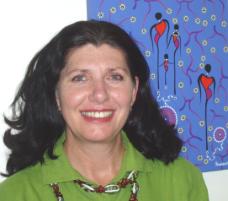Nancarrow joins expert panel to stamp out domestic violence
Published on 17 July, 2009
The Queensland Government has announced an expert Death Review Panel, in an effort to identify gaps in services for victims of domestic and family violence and to prevent further deaths in the future.
Premier Anna Bligh said the panel will investigate the circumstances surrounding domestic violence-related deaths over the past 5 years as well as examine any new cases as they arise in the future.
CQUniversity's Heather Nancarrow has been included among the government and non-government members on the panel. LINK here to the panel membership details
Heather is Director of the Queensland Centre for Family and Domestic Violence Research at CQUniversity Mackay, Chair of the Queensland Ministerial Advisory Council on Domestic and Family Violence and Deputy Chair of the National Council to Reduce Violence Against Women and Children. She has provided advice and support to many national and State advisory groups.
She has more than 27 years of experience in the domestic and family voilence prevention field - including direct service, policy development, research and professional development - and was recently announced as the winner of the Suncorp Queenslander of the Year Community Spirit Award.
# # #
Over the past five years there have been up to 60 domestic violence-related deaths in Queensland.
"The number of domestic violence-related deaths is double that of other homicides and there are around 1000 calls a week to the state's domestic violence help line - those are statistics which tell a sad story and we've simply got to turn them around," Ms Bligh said.
"I'm determined that we bring domestic and family violence out from behind closed doors and deal with it.
"The Death Review Panel is the first stage of this long-term strategy and it will look at options to help prevent domestic violence-related deaths, including whether the Coroner needs wider powers to investigate them.
"It will go further than investigate why these deaths occurred in the past and convene to investigate the reasons behind any deaths as they occur into the future - including what more could have been done to prevent a death and identifying any gaps in services for victims.
"We can then improve our efforts to tackle the real, underlying causes of domestic and family violence."
The government, through the Department of Communities, will also conduct a review of the Domestic and Family Violence Protection Act.
This follows the release of a consultation paper late last year which outlined 5 key areas of action, from prevention and making perpetrators accountable for their actions, to enhancing support services.
In addition, the Federal Government has released Time for Action, the report of the National Council to Reduce Violence against Women and their Children.
"Establishing a domestic violence Death Review Panel aligns Queensland with the directions of the National Plan, putting us in good stead for COAG discussions on collaborations on the national plan in the future.
"The Plan presents opportunities for cooperation and leveraging Commonwealth investment, primary prevention programs, research, programs for perpetrators and changes to family law processes."
Community Services Minister Karen Struthers said domestic and family violence cost the community up to $3.2 billion a year in Queensland.
"It's a huge financial cost, but the social cost to victims is immeasurable and that's why we want to do everything we can to support victims of domestic and family violence," Ms Struthers said.
"Statistics relating to domestic and family violence in Indigenous communities are most disturbing.
"Indigenous women are 35 times more likely to be hospitalised due to family violence than any other Australian women.
"We fund vital crisis accommodation centres and support services right across the state to help people affected by domestic violence. But there are always more steps that can be taken and that's what this strategy is all about."
The Queensland Government's long-term strategy to deal with domestic and family violence will be rolled out over the next 5 years.


